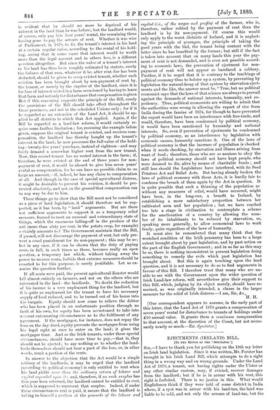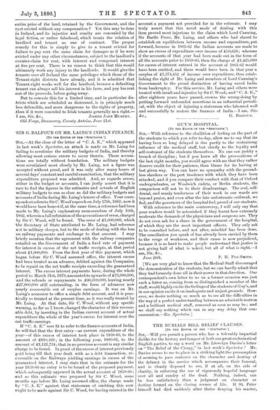EJECTMENTS (IRELAND) BILL.
[To THE EDITOR OF THE " Sncerkroa.1 San,—I have to thank you for publishing on the 19th my letter on Irish land legislation. Since it was written, Mr. Forster has brought in his Irish Land Bill, which attempts to do a right thing in a wrong way and on wrong grounds. Under the Land Act of 1870, a tenant, not having rights under the Ulster or any other similar custom, may, if evicted, recover damages from the landlord; but if he is in arrear with his rent, this right is forfeited. There is no justice in this. What would Englishmen think if they were told of some district in India where, if a ryot was in arrear with his land-tax, the land was liable to be sold, and not only the arrears of land-tax, but the
entire price of the land, retained by the Government, and the ryot evicted without any compensation P Yet this may be done in Ireland, and its injustice and cruelty are concealed by the legal fiction, or rather falsehood, which treats the relation of landlord and tenant as one of contract. The proper remedy for this is simply to give to a tenant evicted for :failure to pay rent the same claim for damages as if he were evicted under any other circumstances, subject to the landlord's .counter-claim for rent, with interest and compound interest .at five per cent. There is no reason to think that this would ultimately work any injury to the landlords. It would give the -tenants over all Ireland the same privileges which those of the Tenant-right districts have already, and it is admitted that Tenant-right works well for the landlord, because a defaulting tenant can always sell his interest in his farm, and pay his rent .out of the proceeds, before going away.
But to concede this for a limited time, and in particular dis- tricts which are scheduled as distressed, is in principle much less defensible, and more dangerous to the rights of property, than if it were conceded to Irish tenants generally as a right.—



































 Previous page
Previous page